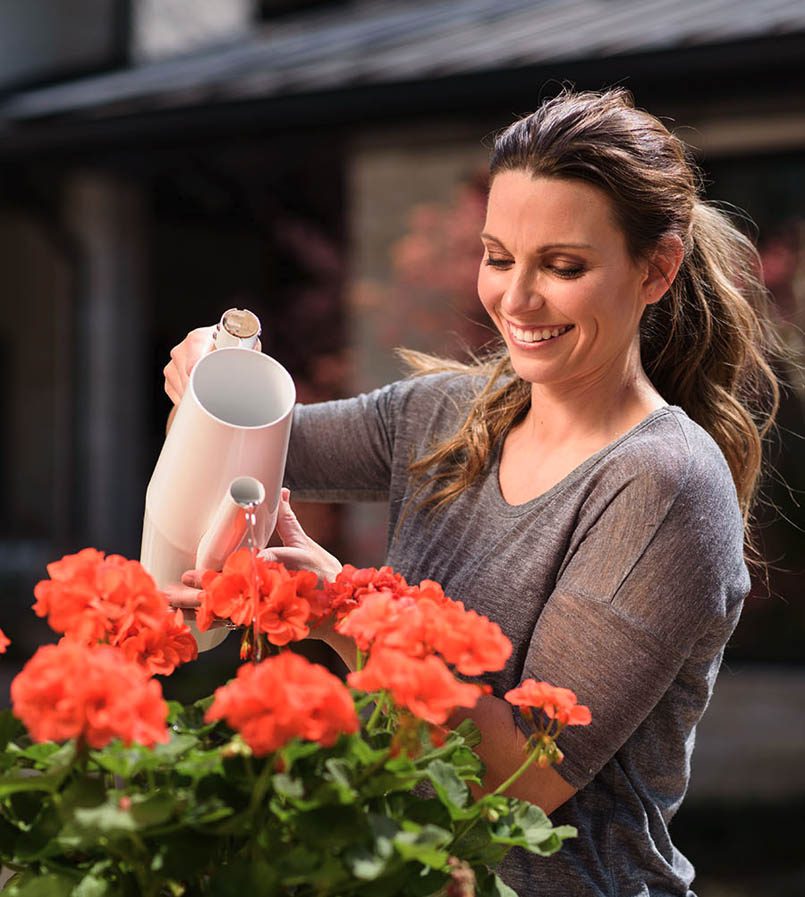19 Aug 2019 Understanding water conservation
by Beth Jimmerson
Summer vacation might be coming to an end, but summer temperatures will be around for a little longer. We all know ways to conserve electricity on a hot day, but air conditioners aren’t the only thing affecting our utility bills this season.
During warmer temperatures, our water consumption rises as well. In fact, we use almost four times as much water in the summer than the rest of the year. Some homes can even use 3,000 gallons of water on a peak day, which is the equivalent of leaving a garden hose running for eight hours straight. That’s a lot of water.
The good news is a few small changes can add up to big savings. Try a few of these water conservation tips so you can save water while still enjoying your favorite summer activities.

Lawns
Don’t over-water your lawn. To see if your lawn needs water, walk on the grass. If it springs back, no need to water. If it leaves footprints, go ahead and set up the sprinklers.
As a general rule, lawns only need one inch of water every five to seven days. Try placing a small empty tuna can near your sprinkler system to help you determine when to turn off the sprinkler. When the can is full, you have watered approximately one inch.
It’s best to water early in the morning or late at night when temperatures and wind speeds are lowest. This can save as much as 30 percent of water lost to evaporation. You can also set your lawn mower blades one notch higher because longer grass is more drought tolerant, which means less water evaporation.
Gardens
Most flower and vegetable gardens require watering to stay productive, but far more plants die from over-watering than under-watering. For many garden plants, the best way is to let your finger be the guide. Dig down several inches near the base of the plant. If the soil is dry, that’s an indication you need to water.
Most well-established trees and shrubs can withstand a prolonged period without rain or watering, and mulching can help retain additional moisture in the soil and around the roots. Apply the minimum amount of fertilizer necessary to yards and plants as they increase water consumption.
Rain barrels
Place rain barrels or buckets beneath your gutters or downspouts. For every 1,000 square feet of roof surface, you will collect 420 gallons of water during every inch of rainfall. You can use the rainwater for outdoor plants or to wash your car. Channel storm water across lawns and into garden beds away from your house.
Swimming pools
Uncovered backyard pools lose hundreds of gallons of water each month from evaporation. Using a pool cover and keeping it covered when not in use will reduce evaporation of water and chemicals by nearly 70 percent.
Check your pool for leaks often, and always consult a professional with pool maintenance to reduce your risk of structural failure like a cracked shell that would waste thousands of gallons of water.
Inside the home
The easiest way to conserve water is turning off the faucet. It sounds silly, but it’s easy to use water when we don’t really need to. Running dishwashers and washing machines when they are full rather than every day can save more than 1,000 gallons of water each month.
Consider a short shower over a bath. A bath can use up to 70 gallons of water, while a shower uses between 10 and 20 gallons. Keep your shower to less than 5 minutes, and you’ll save up to 1,000 gallons per month. Save another eight gallons of water a day each time you turn the water off when brushing your teeth or shaving.
Conway Corp customers don’t have to worry about water. We pour ourselves into serving Conway, and our investment in advanced facilities, innovative water treatments and a local water source means safe, reliable water for our customers at some of the lowest rates in the nation.
Still, we all want to save money and do our part to protect future generations. We’re committed to helping you balance the increasing demand for water with our responsibility of providing affordable rates, and when it comes to conserving water, small adjustments like these can have a big impact.
To learn more about Conway Corp’s efficiency programs, call 501.450.6000 or visit ConwayCorp.com/EnergySmart.
- Conway Corp means managed WiFi - June 30, 2025
- 10 smart ways to conserve water this summer - June 1, 2025
- Energy Smart Summer - May 11, 2025











